Nineteenth Century Mail-Order Bride SCAMS, Part 1
Nineteenth Century Mail-Order Bride Scams, Part 1
.
Often, FACT is stranger than FICTION.
.
This article is Part 1 of a new sequence of blog posts regarding historical facts. Facts surrounding a variety of scams regarding Victorian American marriage.
.
Mail-order brides, matrimonial agencies, long-distance marriage contracts, disreputable persons, and ‘friends’ seeking diversion. This series of blog articles covers it all.
.
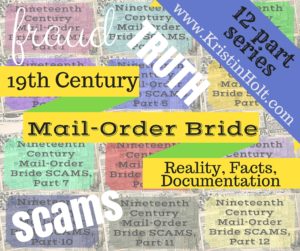
.
Here you are, at the beginning, ready to dive into the scandals behind the shiny veneer of mail-order brides.
.
Sounds like Fiction
.
Readers of Mail-Order Bride-themed Historical Romance aren’t likely to find many FACTS in the fiction we love.
But that doesn’t mean the true history behind the popular niche isn’t fascinating. Especially to those who read and write it.
.
Well-known Risks: Mail-Order Brides
.
In Newspaper Brides vs Mail-Order Brides, I addressed the two-sided Public Opinion regarding the idea of seeking a life partner. Options included: an agency, personal advertisement, or other assistance. That last post cited an article that shed a positive light on the process of a “Mail-Order Bride.”
.
On another note, that post also debunked the myth that Victorian-Americans actually called such arrangements by mail “Mail-Order Brides.” Thus we’ve agreed to refer to these marriages as such.
.
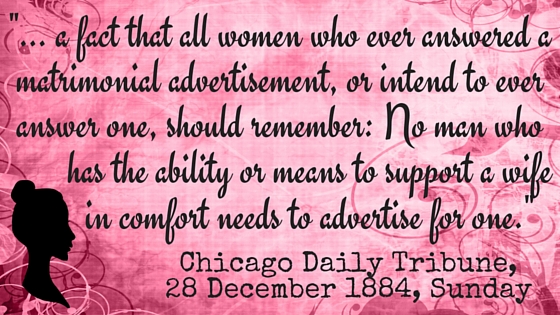
.
VOLUME
.
It’s evident, merely by the volume, frequency, and vehement tenor of the WARNINGS. Newspapers shouted “watch out” in every state and territory, and kept on shouting for long enough to call “decades.”
.
BEWARE: –of swindled fortunes, disappointed misses, and disappearing funds. Tales abounded; grooms sent train fare and expenses to their brides-to-be, throwing good money after bad.
.
As a result, one thing is painfully clear: Most everyone knew the risks.
.
Most everyone knew that public opinion ran contrary to “mail-order” love or matrimony.
.
Victorian Americans did not cotton to the notion of marriage through any sort of brokerage, company, or matrimonial ad placed independently. Yes, folks wrote them out of desperation and loneliness. And near everybody else laughed heartily at their foolishness.
.
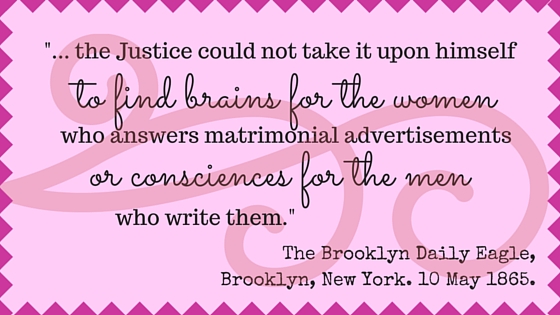
.
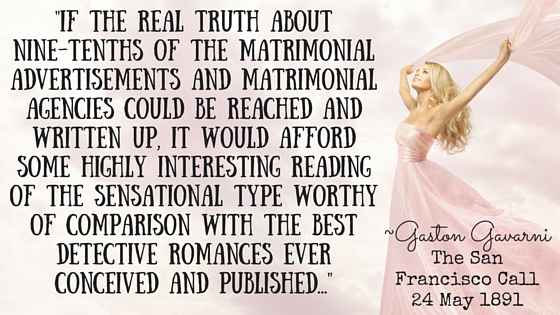
.
It seems the possibility of finding love (or at least a companionable, legitimate marriage) through a matrimonial service or personal advertisement was slim to none. There must have been an occasional happy story or two because people kept answering advertisements and someone other than newspaper reporters and swindlers kept writing them.
.
At the time of Fritz Podzius (editor and publisher of Matrimonial News)’s death in 1916, he’d claimed to have facilitated the marriages of 20,000 couples.
.
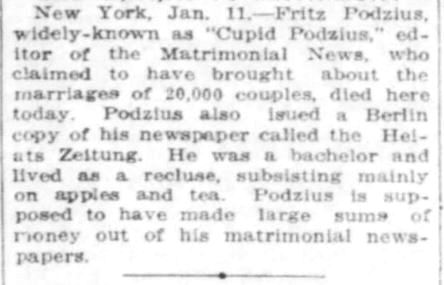
The York Daily, York, PA. 12 Jan 1916. Death notice of Fritz Podzius, and his claim of bringing about 20,000 marriages.
.

.
NEWSPAPER REPORTERS
.
Oh, yes. Newspaper reporters. Whether or not they felt they were exposing crime, shedding light on a growing problem, pointing out the fallacy of youthful hearts engaging in such faulty methods of finding love… their meddling no doubt broke more than one heart and caused more than one young miss serious embarrassment. In studying historic newspapers, I found dozens and dozens of similar articles wherein an investigative reporter (male and female alike) pose as spouse-seeking society-respected adults and enter into a contract with a matrimonial agency or simply post an advertisement in the classifieds, such as the example that follows.
.
The following example is a portion of an article printed in the Chicago Daily Tribune on Sunday, 28 December, 1884.
.
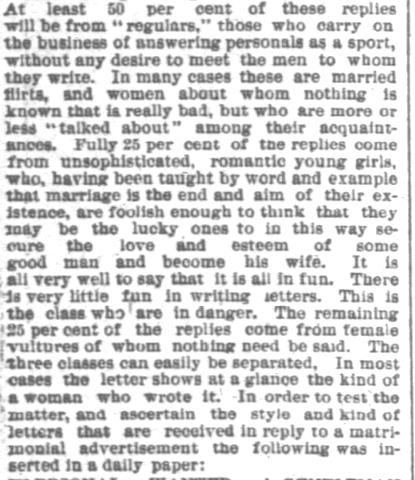
1 of 3). Portion of an article printed in Chicago Daily Tribune on Sunday, 28 December, 1884.
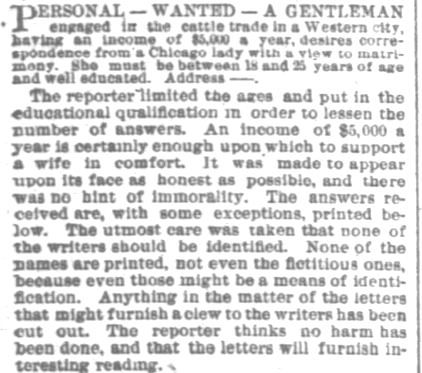
2 of 3). Portion of an article printed in Chicago Daily Tribune on Sunday, 28 December, 1884.
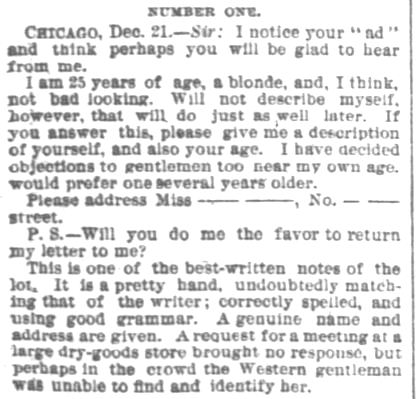
3 of 3). Portion of an article printed in Chicago Daily Tribune on Sunday, 28 December, 1884.
.
BOREDOM AND ENTERTAINMENT
.
Some men sought a bride to work beside them on farms and in raising families (little more than an unpaid worker), and some men (obviously bored and seeking entertainment) posted ads as jokes and simply for their own entertainment. Newspapers of the era are filled with anecdotes and stories (probably with a kernel of truth) about men seeking fun by corresponding with hopeful ladies when they had zero intention of offering marriage. An equal accounting of flirtatious women (most of them already wed) carried on correspondences with men they had no intention of meeting. They must have found it diverting. And fun. And perhaps a little naughty.
.
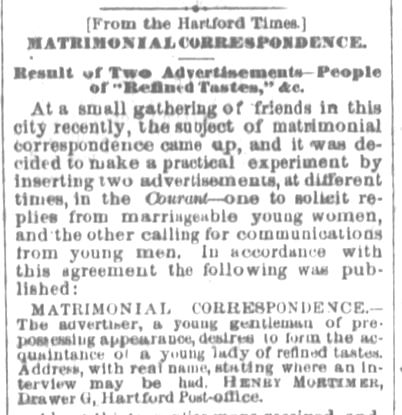
Matrimonial Correspondence, The Cincinnati Enquirer, 18 Oct 1869
.
PRACTICAL JOKES
.
Some advertisements consisted of nothing more than practical jokes.
.
The Matrimonial News found itself embroiled in scandal by not requiring identification or references. “Friends” often found themselves the brunt of a joke, receiving correspondence from hopeful but unknown parties. An example follows.
.
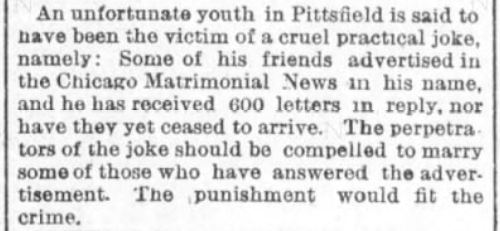
Boston Post, Boston Massachusetts, 16 Feb 1891
.
What about you?
.
If the brunt of a practical joke in matters of the heart, would you ever dare risk love again?
.
Most people would be leery. I can’t imagine (or perhaps I can) what became of those who risked responding to an advertisement only to learn the remarkable-sounding gentleman on the other end of the correspondence was actually a newspaper reporter. Or worse, a woman who didn’t like me and decided to harm me.
.
I‘m interested, and I’m sure all readers are, too. What are your thoughts on this subject? Please respond in the fields provided, below.
.
Up Next
Nineteenth Century Mail-Order Bride SCAMS, Part 2. Delving into money-making scams! Perpetrators fraudulently relieved the lonely of their money. Unfortunately, there are more stories to explore and more methods of defrauding women (and men). Villains aimed to lighten their marks’ pocketbooks. And poke holes in their dreams.
.
.
Related Articles
.
.
The Rest of the Series
.
.
Updated June 2022
Copyright © 2016 Kristin Holt LC
Nineteenth Century Mail-Order Bride SCAMS, Part 1 Nineteenth Century Mail-Order Bride SCAMS, Part 1

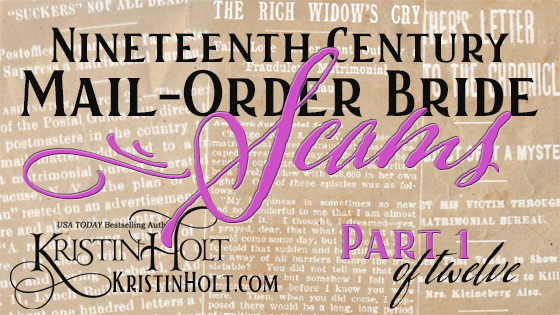
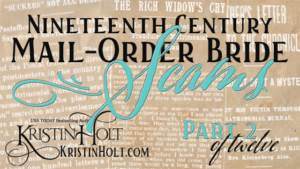
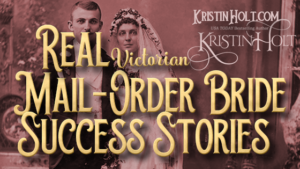
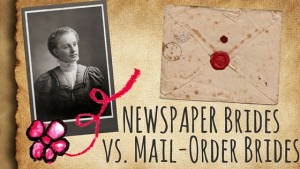
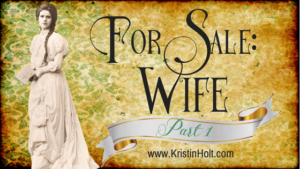
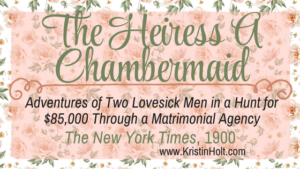
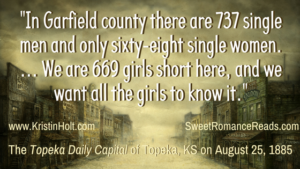
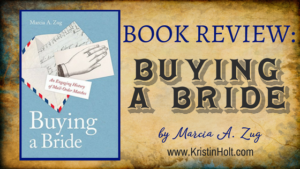

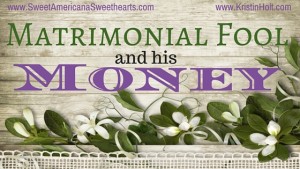
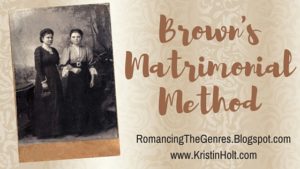
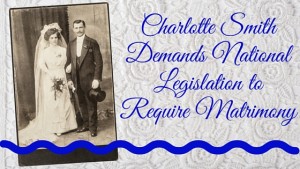
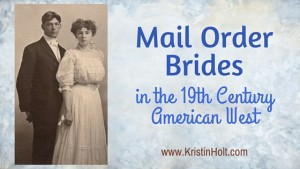
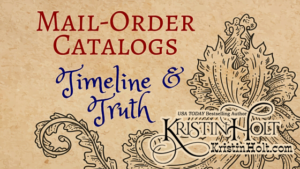
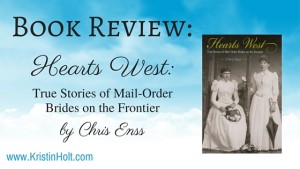
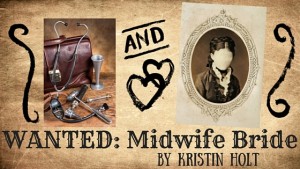
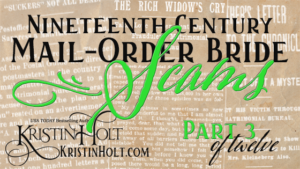
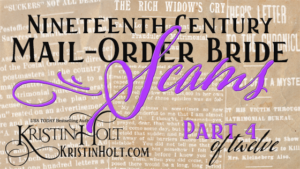
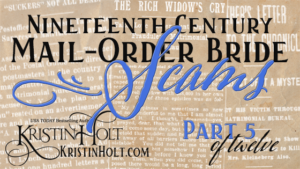
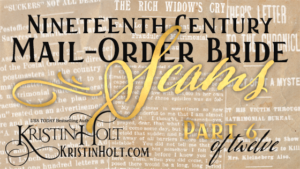
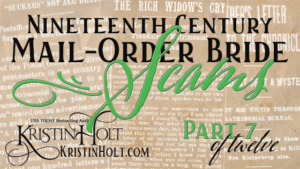
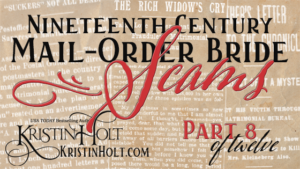
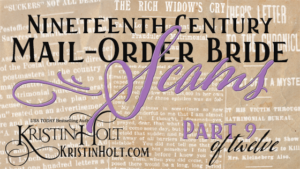
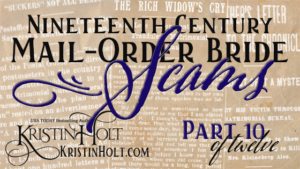
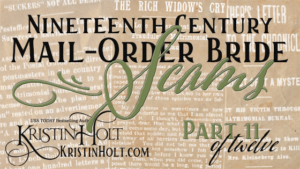
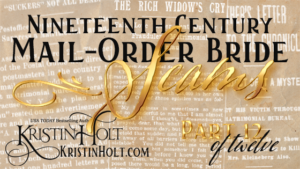






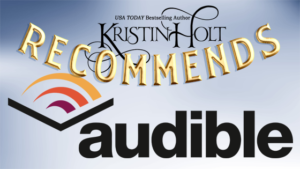

Not much different from the online dating that takes place now, is it?
Oh, I agree, Karen! Online dating today is essentially the same thing as yesteryear’s mail order bride (or newspaper bride) attempts at finding a partner. =) Same needs. Same human desires. Different time period. Thanks for stopping by!
~ Kristin